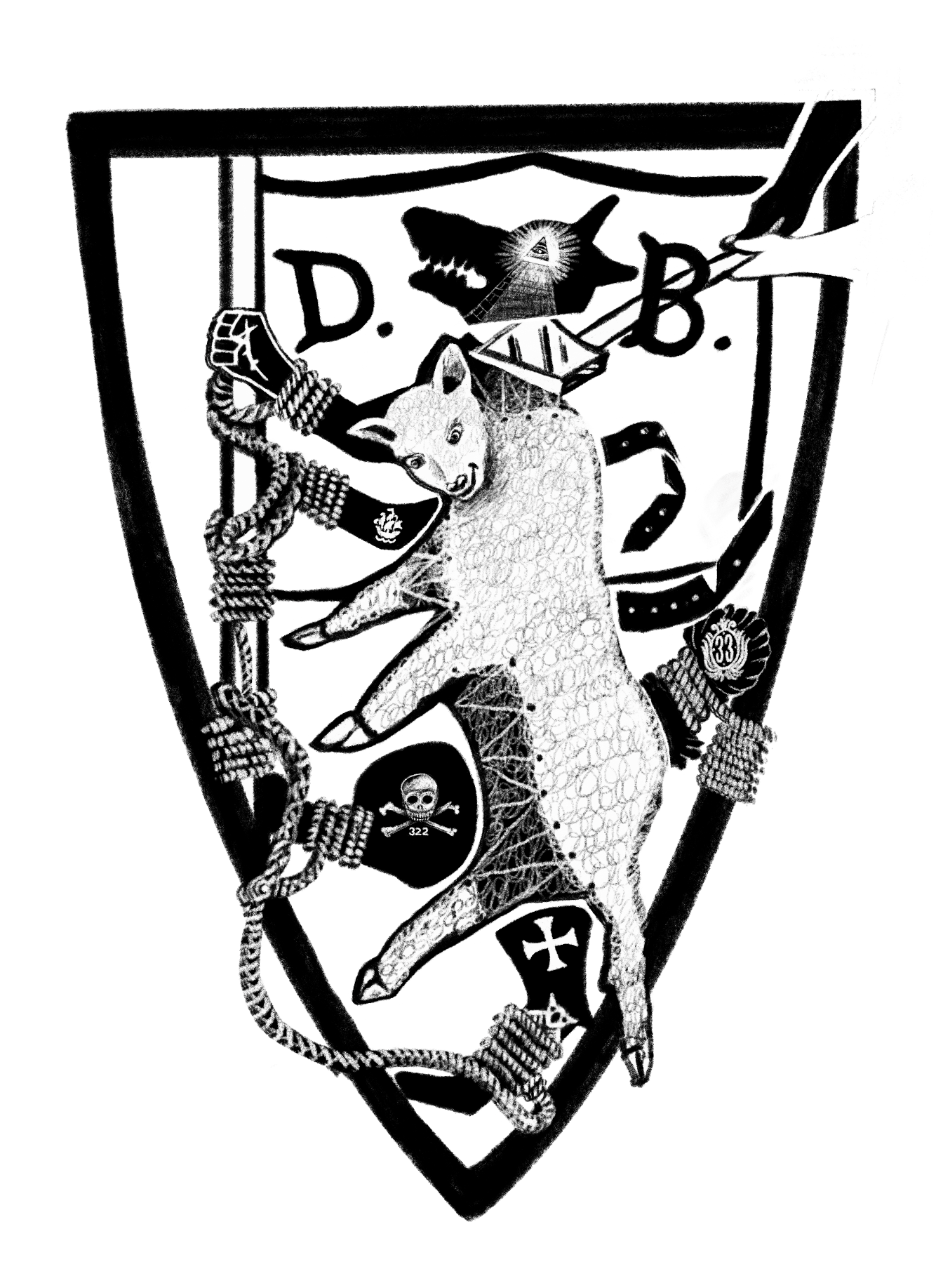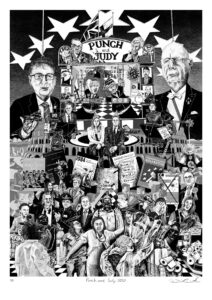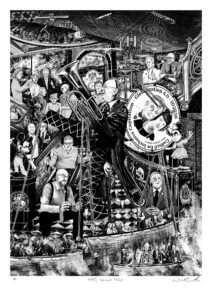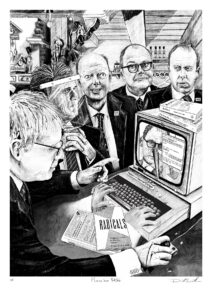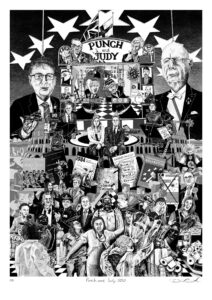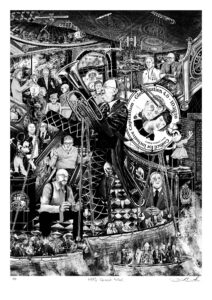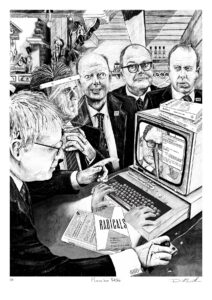“PHONETICALLY SPEAKING” To reflect the fast pace of world news, my blog is probably best served as a stream-of-consciousness text. Fast and unadulterated. With this approach, and on first encounter, text might not seem to scan. This is because I am dyslexic. Instead of keeping the proof-readers busy, I would rather let my blog updates of my visual work stand as a record of my experience of dyslexia, which I am keen that you now get to enjoy too. Unlike some news outlets, I hereby excuse myself the need for a ‘corrections’ section! The excitement of a new language is something I’m quite familiar with, and it is with this ‘joie de vivre’ that I am delighted to guide you through my thought and work processes, more phonetically (than fanatically) speaking.
Philosophy in Motion: A Dyslexic’s Political Lens – A New English Socialism: Embracing Sovereignty and Community

A New English Socialism: Embracing Sovereignty and Community
For too long, British politics has been trapped in a stale cycle either an overbearing state that strangles independence or a ruthless capitalism that strips dignity from labor. Neither of these models serves the people they claim to represent. It’s time for something different. It’s time for a political movement that takes the best of England’s past our tradition of self-reliance, localism, and moral capitalism and reclaims it from bureaucrats and oligarchs alike.
A Socialism Rooted in Sovereignty
The original British socialists were not state-worshipping technocrats. They were cooperators, free-thinkers, and champions of local self-governance. They believed in the dignity of labor, not in dependence on government handouts. They saw mutual aid as a form of strength, not a sign of weakness. This is the socialism of the Guilds, of the Chartists, of the cooperative movements where economic fairness is built from the ground up, not imposed from above.
Today, we propose a new model: The Sovereign Commonweal. A movement that defends individual liberty while ensuring economic justice. That supports enterprise without surrendering to corporate monopolies. That restores local governance, instead of selling our communities to distant bureaucracies.
A Movement for the Makers, the Doers, the Thinkers
Art and politics are not separate. The British tradition has always understood that culture shapes power. A dyslexic artist knows better than most the dangers of rigid bureaucratic control when systems are designed to exclude, to enforce conformity, to reward obedience over creativity. We reject the modern obsession with managerial politics and reclaim the radical spirit of those who built this nation: the artisans, the writers, the inventors, and the workers who refused to be owned by either the Crown or the Company.
This movement stands for:
- Sovereignty of the Individual – We are not cogs in a machine. We reclaim the right to work, create, and think freely. We reject both corporate servitude and state dependency.
- Moral Capitalism – Markets should serve people, not the other way around. Monopolies, exploitation, and financial speculation are antithetical to real economic growth. Fair wages and worker respect must be at the heart of our economy.
- Personalized Leadership – The director of a company should know every one of their employees. Leadership should be personal, accountable, and rooted in relationships, not in corporate hierarchies that distance decision-makers from those they serve. A business is a community, not an abstract profit engine.
- Localism & Mutual Aid – The best governance is done closest to the people. Communities should control their own economies, resources, and institutions. We replace bureaucracy with local leadership, accountability, and shared responsibility.
- A Political System that Works for Us – No more career politicians. No more parties that pretend to represent the working class while dining with oligarchs. We need a system where decisions are made by those who are accountable to their communities, not their donors.
Embracing Diversity, Protecting Sovereignty
We understand that modern society is diverse, and we embrace all faiths, cultures, and ways of life provided they do not infringe upon the sovereignty of others. The idea that “diversity is our strength” is often overstated; it is shared valuesand common purpose that truly unite us. As long as each individual’s freedom does not harm another’s, we can live in harmony, respecting the rights and freedoms of all people. Everyone is free to live according to their beliefs, as long as those beliefs play by the rules of mutual respect and personal responsibility. This is not about forcing assimilation, but about ensuring that the sovereignty of each individual is honored.
Classic Thinkers: A Bridge Between Conservatism and Socialism
Our vision of a just society also draws from the wisdom of classic thinkers who, though often associated with conservatism, valued social responsibility and individual liberty. As Edmund Burke said:
“The state is a partnership in all science, a partnership in all art, a partnership in every virtue, and in all perfection.”
This resonates with our belief in a society where community is at the heart of every endeavor whether it’s business, politics, or art. Burke believed in the importance of preserving a social contract, and we, too, seek a society where individuals and institutions work together for the common good.
William Morris, a champion of traditional British socialism, wrote:
“The only true socialism is the socialism of the people, not the socialism of the State.”
We, too, reject the idea of a paternalistic, top-down socialism. Our vision is one where the people, in all their diverse capabilities, shape the social and economic structures around them, not the state imposing its will upon them.
Finally, from the conservative philosopher and economist Adam Smith, we draw this foundational wisdom:
“The great secret of education is to direct vanity to proper objects.”
Smith understood that human nature drives both greed and creativity. In our model, we aim to redirect ambition and innovation toward the greater good—personal liberty combined with collective responsibility, creating a society that rewards both the individual and the community.
**This is not nostalgia. This is not a utopian dream. This is a necessary reclamation of what we lost: a politics of dignity, self-reliance, and justice. A movement for those who refuse to be owned. A Sovereign Commonweal.
Join us. Build it. Forge it.
